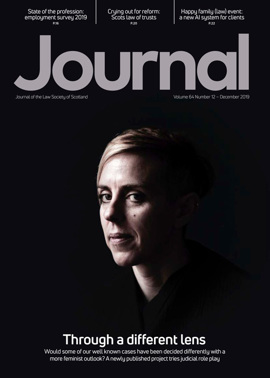Scottish Solicitors' Discipline Tribunal

Simon David Brown
A Complaint was made by the Council of the Law Society of Scotland against Simon David Brown, solicitor, Irvine. The Tribunal found the respondent guilty of professional misconduct. Between 11 April 2015 and 17 February 2018, he published posts on Twitter referring to Orange walks in terms which were apt to be categorised as, and likely to be considered, discriminatory, sectarian, derogatory, and offensive in their nature and which were capable of bringing the profession into disrepute, drew his integrity into question and breached rule B1.2 of the Law Society of Scotland Practice Rules 2011.
The Tribunal censured the respondent and fined him £6,000.
The tweets were made over a three-year period. Twitter is a public forum and once published the respondent had no control over the material. There was widespread national media coverage of the tweets. The respondent was identifiable as a solicitor from his Twitter account. Sectarianism brings the profession into disrepute. The remarks were provocative and likely to cause offence. They raised questions about the respondent’s integrity. The conduct represented a serious and reprehensible departure from the standards of competent and reputable solicitors.
William K L Brownlie (s 42ZA appeal)
An appeal was made under s 42ZA(10) of the Solicitors (Scotland) Act 1980 by Euan Campbell against the determination by the Council of the Law Society of Scotland dated 25 October 2018 in respect of a decision not to uphold a complaint of unsatisfactory professional conduct by the appellant against William K L Brownlie, Stirling & Gilmour, Alexandria and Helensburgh, who did not enter the appeal process.
The Tribunal confirmed the Society’s determination. The Tribunal was satisfied that the solicitor-client relationship did break down. This was sufficient to constitute just cause for withdrawal. When a client raises lack of faith and a potential indemnity claim, solicitors are exposed and placed in a very difficult position. It can be difficult to ensure that any subsequent advice is truly independent. Solicitors must be free to withdraw if they can meet the requirements of rule B1.12. There was no requirement for the subcommittee to examine the reasons for the breakdown (the causes of “the cause”). If a solicitor caused the relationship to break down, the client was not without remedy. The client could raise an action in negligence or a complaint about the conduct or service relating to the actions which caused the breakdown.
There was no requirement to find a “technical breach” of rule B1.12 as suggested by the appellant.
Withdrawing caused a financial detriment to the appellant, but withdrawal was not in breach of the rule. Whether the work was being paid for in the usual way or being carried out pro bono, the rule regarding withdrawal from acting must apply to protect solicitors and their clients. The Tribunal could not criticise the subcommittee’s reasoning for rejecting the appellant’s arguments about passing the case on to another solicitor in the firm. The appellant was given reasonable notice and withdrawal did not prejudice the course of justice. The appellant was able to secure representation and was ultimately successful in his court action. The subcommittee’s reasoning disclosed no error of law or error in the application of the law to the facts.
John Fleming Hamilton
A complaint was made by the Council of the Law Society of Scotland against John Fleming Hamilton, solicitor, Kirriemuir. The Tribunal found the respondent guilty of professional misconduct.
The Tribunal ordered that the name of the respondent be struck off the roll of solicitors in Scotland.
The respondent failed to advise Ms A and Ms B that the fee for an executry would be materially higher than the percentage fee, and failed to advise them when the limit of the percentage fee was approached and separately when it was exceeded. He failed to advise Ms A and Ms B that he was suspended and his client account frozen. He took client funds to fees in breach of rule B6.5.1(d). He failed to remit sums to the Queen’s & Lord Treasurer’s Remembrancer as required by rule B6.11.5. He misled Mrs K by suggesting she was an executor in order to obtain payment of fees. He failed to comply with rule B6.23 and the Money Laundering Regulations 2007. He failed to act in his clients’ best interests. He failed to carry out instructions competently and within a reasonable period of time. He failed to communicate effectively with his clients and others. He failed to render a fee note to Mrs D prior to debiting the joint account in settlement of a matrimonial fee. He failed to seek the written authority of Mr C and Mrs D prior to debiting the joint account in settlement of a matrimonial fee. He failed to maintain in the joint account the total sum due to be shared between Mr C and Mrs D. He failed to communicate effectively with the complainers, in breach of rule B1.9. He failed to ensure that client confidentiality was maintained, in breach of rule B1.6. He failed to act in the best interests of his clients, in breach of rule B1.4. The conduct across the whole complaint demonstrated a danger to the public and was likely to seriously damage the reputation of the legal profession. The respondent’s conduct showed that he was not a fit person to be a solicitor.
The Tribunal awarded £5,000 compensation jointly to Ms A and Ms B. It awarded £3,500 compensation to Ms G.
John Robert Mitchell
A complaint was made by the Council of the Law Society of Scotland against John Robert Mitchell, solicitor, Edinburgh. The Tribunal found the respondent not guilty of professional misconduct. The Tribunal did not consider that the conduct established met the test for unsatisfactory professional conduct and therefore declined to remit the complaint to the Society in terms of s 53ZA of the Solicitors (Scotland) Act 1980.
The respondent admitted failing to act in the secondary complainer’s best interests and failing to carry out instructions adequately and completely within a reasonable time.
The Tribunal considered that the respondent, by his admitted conduct, had breached the practice rules.
However, it also had regard to the context where the failures took place over an eight and a six month period during a four year relationship which appeared only to have broken down two years later over a fee dispute. The respondent did not deceive or mislead the client. It was an isolated case. No adverse consequences flowed from the delay. The relationship with the client did not break down as a result of the delay or deficiencies in communication. The Tribunal therefore was of the view that in this context, the respondent’s behaviour could not be described as a serious and reprehensible departure from the standards of competent and reputable solicitors. The conduct was not likely to harm the reputation of the profession. The public did not require protection.
Hugh Scott Neilson
A complaint was made by the Council of the Law Society of Scotland against Hugh Scott Neilson, solicitor, Airdrie. The Tribunal found the respondent guilty of professional misconduct in respect of his contravention of rules B1.2, B1.4, B1.9 and B1.14 of the Practice Rules 2011, his failure to act in accordance with the principle of honesty and integrity and his failure to comply and act in accordance with his professional obligations and to reply to the enquiries made of him by the Society.
The Tribunal ordered that the name of the respondent be struck off the roll of solicitors in Scotland.
The respondent misled his client, Mr A, albeit by omission, for in excess of two years. The respondent failed to advance Mr B’s case, failed to communicate effectively with him or to act in his best interests. The respondent adjourned two diets of proof due to his lack of preparation and conceded expenses, all without his client’s instructions. Thereafter, he misled his client as to the causes of the adjournments in order to conceal his lack of preparation. The respondent acted for Mr D knowing that he was already represented by another firm of solicitors, without making his involvement known to that firm. He did not contact the Police Federation to enquire whether they would fund the case. This was not in his client’s best interests nor consistent with his duty to act with other solicitors in mutual trust and confidence. The respondent lied to Ms E to conceal his inaction. In Dr G’s case, the respondent failed to respond to correspondence from another solicitor for about a year. That solicitor could not progress an executry without the information from the respondent. The respondent gave two separate undertakings to provide the information, neither of which he obtempered. He did not communicate effectively. He accepted instructions where he was unable to carry them out adequately and completely within a reasonable time. He acted in a manner inconsistent with other solicitors having mutual trust and confidence. He acted in a way that allowed his personal and professional integrity to be called into question. The respondent failed to respond or cooperate with the Society in respect of the five complaints.
The Tribunal awarded £2,500 compensation to Mr A and £4,000 to Mr B. It allowed Ms E to withdraw her claim for compensation, the matter having been settled by parties.






